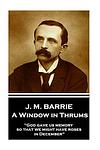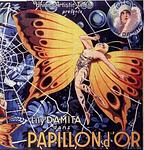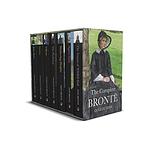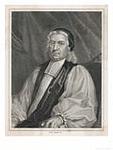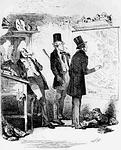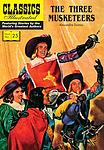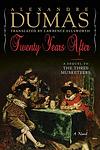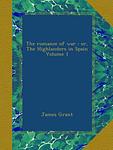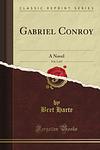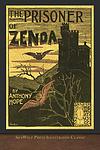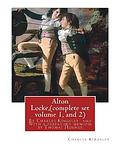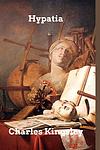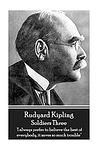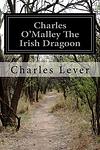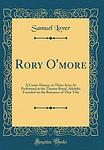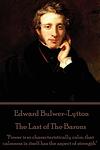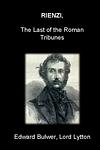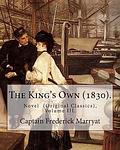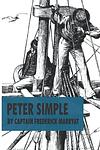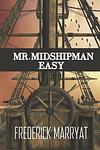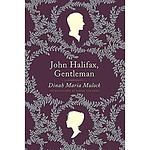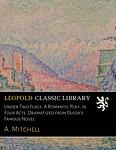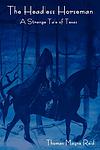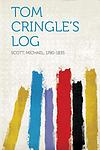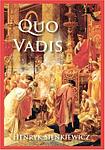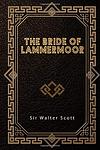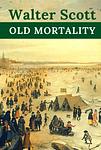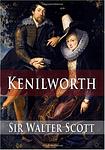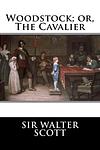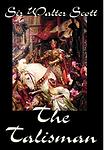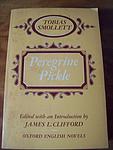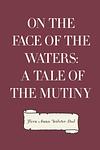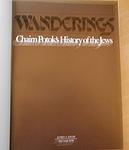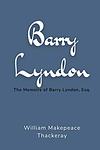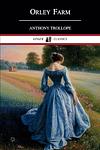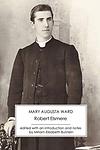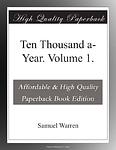100 Best Novels in the World (Published in 1899)
This is one of the 284 lists we use to generate our main The Greatest Books list.
-
The Tower Of London by William Harrison Ainsworth
The book is a historical novel set in the 16th century, centered on the infamous Tower of London, an emblem of royal power and tragedy. It interweaves real historical figures and events with fictional characters, focusing on the reigns of Kings Henry VIII and Edward VI. The narrative unfolds through the experiences of Lady Jane Grey, among others, as she faces her ill-fated days as Queen of England. The novel encapsulates the intrigue, romance, and betrayal of the Tudor court, highlighting the Tower's role in the imprisonment, torture, and execution of English nobility, while also exploring the lives of the common people during this turbulent period in English history.
-
Old St Paul's by William Harrison Ainsworth
Set against the backdrop of the Great Plague and the Great Fire of London in the 17th century, the novel weaves a tale of tragedy, romance, and redemption. It follows the lives of several characters, including a clergyman and his family, as they navigate the perils of a city ravaged by disease and destruction. The story is characterized by its vivid descriptions of the period's historical events, the resilience of the human spirit, and the central role of the iconic cathedral, which stands as a beacon of hope amidst chaos. Interlaced with superstition, societal critique, and personal drama, the narrative offers a dramatic and engaging portrayal of one of the most tumultuous times in London's history.
-
Windsor Castle by William Harrison Ainsworth
Set against the backdrop of England's rich history, this novel weaves a tapestry of intrigue, romance, and betrayal within the walls of the royal residence, Windsor Castle. The narrative intertwines the lives of historical figures and fictional characters during the reign of King Henry VIII. Central to the plot is the king's infatuation with Anne Boleyn and the subsequent decline of his marriage to Catherine of Aragon. The story captures the opulence and grandeur of the Tudor court, as well as the dark undercurrents of political machinations, while exploring the human emotions and ambitions that resonate through the castle's stately halls.
-
Pride and Prejudice by Jane Austen
Set in early 19th-century England, this classic novel revolves around the lives of the Bennet family, particularly the five unmarried daughters. The narrative explores themes of manners, upbringing, morality, education, and marriage within the society of the landed gentry. It follows the romantic entanglements of Elizabeth Bennet, the second eldest daughter, who is intelligent, lively, and quick-witted, and her tumultuous relationship with the proud, wealthy, and seemingly aloof Mr. Darcy. Their story unfolds as they navigate societal expectations, personal misunderstandings, and their own pride and prejudice.
-
Sense and Sensibility by Jane Austen
This classic novel explores the lives of the Dashwood sisters, Elinor and Marianne, as they navigate love, heartbreak, and societal expectations in 18th-century England. The two sisters, one characterized by practicality and restraint (sense) and the other by emotional intensity and romanticism (sensibility), must negotiate their paths through a world where marriage often has more to do with wealth and social status than with love. The story is a sharp critique of the limitations placed on women in a rigidly patriarchal society.
-
Father Goriot by Honoré de Balzac
"Father Goriot" is a classic French novel that explores the themes of wealth, power, love, and social status in 19th century Paris. The narrative follows the lives of three main characters: a young, ambitious law student who seeks to rise above his modest background; an elderly, once-wealthy man who has sacrificed everything for his two ungrateful daughters; and a crafty, ruthless criminal who manipulates others for his own gain. Their stories intertwine in a boarding house, revealing the harsh realities of Parisian society and the destructive power of unchecked ambition and selfishness.
-
A Window In Thrums by J. M. Barrie
"A Window in Thrums" is a poignant and evocative tale that transports readers to a quaint Scottish village, where they peer through the window into the daily lives of its inhabitants. The narrative, rich with local dialect and customs, centers around the domestic life of an elderly, bedridden woman and her relationships with her neighbors and visiting friends. Through a series of vignettes, the book paints a vivid portrait of rural Scottish life in the late 19th century, capturing the humor, tragedies, and enduring human spirit of the community. The story's charm lies in its simplicity and the author's keen observation of the small details that define the characters' existence.
-
The Golden Butterfly by Walter Besant, James Rice
"The Golden Butterfly" is a Victorian novel that weaves the tale of a talented and beautiful actress who rises to fame and fortune, capturing the hearts of London's elite. Her mysterious origins and the secret of her birth become the focal point of the narrative, as various characters, including a wealthy banker, a struggling playwright, and an ambitious financier, become entangled in her life. The story explores themes of love, ambition, and the pursuit of wealth and status, set against the backdrop of the glittering but often ruthless world of the late 19th-century theatre scene. As the characters navigate their complex relationships and personal desires, the enigma of the actress's past and the pursuit of the titular "Golden Butterfly" drive the plot towards its dramatic conclusion.
-
Robbery Under Arms by Rolf Boldrewood
The novel is a captivating tale of adventure and crime in the Australian bush, narrated by Dick Marston, a member of a notorious gang led by the charismatic Captain Starlight. The story follows the Marston brothers as they are drawn into a life of bushranging, cattle duffing, and gold robbery, driven by both circumstance and the allure of freedom and riches. As they navigate the perilous world of colonial Australia's outlaws, they encounter a vivid cast of characters, from fellow outlaws to the police who relentlessly pursue them. The narrative explores themes of loyalty, family, and the moral ambiguity of their criminal actions, set against the backdrop of the harsh yet beautiful Australian landscape.
-
Lady Audley's Secret by M. E. Braddon
The novel revolves around the beautiful and enigmatic Lady Audley, who harbors a dark secret that threatens to unravel her new life of luxury and status upon marrying Sir Michael Audley. When Sir Michael's nephew, Robert Audley, becomes suspicious of his new aunt's past, he embarks on a quest for the truth, leading to a series of dramatic and suspenseful events. The story delves into themes of identity, bigamy, and the role of women in Victorian society, as the characters grapple with the consequences of deception and the pursuit of justice.
-
Jane Eyre by Charlotte Bronte
The novel follows the life of Jane Eyre, an orphan who is mistreated by her relatives and sent to a charity school. As she grows up, Jane becomes a governess at Thornfield Hall, where she falls in love with the brooding and mysterious Mr. Rochester. However, she soon learns of a dark secret in his past that threatens their future together. The story is a profound exploration of a woman's self-discovery and her struggle for independence and love in a rigid Victorian society.
-
Shirley by Charlotte Bronte
Set in the industrializing England of the Napoleonic wars and Luddite revolts against mechanization, this novel centers on the contrasting lives of two women: the strong-willed Shirley Keeldar, who inherits her uncle's estate and assumes a traditionally masculine role as its manager, and the more timid Caroline Helstone, who lives with her uncle, a local clergyman. The narrative explores themes of gender, social class, and industrialization, as it follows the personal and romantic trials of these women. Their stories intertwine with the local mill owner, Robert Moore, who seeks to modernize his mill despite worker unrest, and the impact of these changes on the broader community. The novel examines the role of women in society and the ways in which they navigate the challenges of love, friendship, and societal expectations during a time of cultural and economic upheaval.
-
The Deemster by Hall Caine
The novel is a dramatic tale set on the Isle of Man in the 19th century, revolving around the life of a young man who, after a series of personal and moral failures, including being involved in a man's death, is exiled and disowned by his father. As he endures hardship and seeks redemption, he ultimately rises to become a Deemster, a high judge on the island, and must confront his past actions and their consequences. The story explores themes of justice, penance, and the possibility of moral redemption, against the backdrop of Manx society and its legal traditions.
-
Valentine Vox by Henry Cockton
The novel follows the adventures of Valentine Vox, a young man who discovers he has a talent for ventriloquism and decides to leave his unhappy home to pursue his new skill. Throughout his journey, he encounters a series of colorful characters, gets entangled in a variety of humorous and dramatic situations, and uses his ventriloquist abilities to influence and manipulate events. His journey is not only one of professional development but also personal growth as he navigates the complexities of society, love, and identity. The book is a satirical commentary on 19th-century England, touching upon issues of social injustice and the human condition.
-
The Woman in White by Wilkie Collins
A captivating tale of mystery and suspense, "The Woman in White" follows the story of a young art teacher, Walter Hartright, who encounters a mysterious woman dressed in white on a moonlit road. The woman is revealed to be a mental asylum escapee, and as Hartright delves into her story, he uncovers a web of deceit, madness, and dangerous secrets involving a wealthy, titled family. The narrative explores themes of identity, insanity, and the abuse of power, with a complex plot filled with twists and turns.
-
The Moonstone by Wilkie Collins
"The Moonstone" is a detective novel that revolves around a large, valuable yellow diamond that was stolen from an Indian temple and is now in England. The diamond is bequeathed to a young woman on her eighteenth birthday, but is stolen that same night. The novel follows the investigation of the theft, which is complicated by a series of confusing events and false leads. The resolution involves the unraveling of a tangled web of deception, crime, and colonial guilt.
-
The Last of the Mohicans by James Fenimore Cooper
Set during the French and Indian War, this historical novel follows the journey of Hawkeye, a skilled frontiersman, and his two Mohican companions as they guide two daughters of a British colonel through the dangerous wilderness of the American frontier. The group faces numerous perils and conflicts, not only from the war-torn landscape and hostile tribes, but also from a treacherous Huron scout. The novel explores themes of racial conflict, survival, and the fading of indigenous cultures.
-
The Pathfinder by James Fenimore Cooper
"The Pathfinder" is a historical novel set in the mid-18th century during the French and Indian War, focusing on a brave and skilled scout known for his deep understanding of the American wilderness. He aids the British military in navigating the treacherous terrain of the Great Lakes region, while also embarking on a personal journey of love, loyalty, and friendship. The protagonist's expertise in woodcraft and his honorable nature make him a heroic figure, as he confronts the challenges of both natural obstacles and human conflicts, weaving a tale of adventure and romance amidst the backdrop of colonial America's struggle for control and survival.
-
The Prairie by James Fenimore Cooper
"The Prairie" is a tale set in the early 19th-century American frontier, where Natty Bumppo, an aging frontiersman better known as "the trapper" or "Leatherstocking," navigates the challenges of the untamed West. He encounters various settlers and Native Americans, as well as a family in distress, and becomes embroiled in conflicts that arise from the encroachment of civilization on the wilderness. As the European-American settlers clash with the indigenous tribes and amongst themselves over land and resources, the trapper's experience and wisdom become crucial in navigating the moral complexities and the physical dangers of the expansive prairie. The novel explores themes of manifest destiny, the impact of westward expansion, and the inevitable transformation of the natural landscape and Native American cultures.
-
Mr Isaacs by F. Marion Crawford
This novel is a captivating tale of love, spirituality, and political intrigue set in British colonial India. It follows the story of a refined and cultured Afghan diamond merchant who, despite his wealth and education, faces the prejudices and complexities of the British Raj. The protagonist's life takes a dramatic turn when he falls in love with an Englishwoman, leading to a poignant exploration of cultural differences, personal sacrifice, and the pursuit of happiness. As the narrative unfolds, the book delves into the mystical aspects of Eastern philosophy and the harsh realities of imperialistic rule, providing a rich and layered portrayal of 19th-century India.
-
Martin Chuzzlewit by Charles Dickens
The novel centers around the experiences of its namesake character, an elderly and wealthy man who becomes disillusioned by the selfishness of his family members, all of whom are eager to inherit his fortune. The story explores themes of greed, betrayal, and redemption as young Martin Chuzzlewit, the grandson, embarks on a journey of personal growth and moral enlightenment. Set against the backdrop of both England and America, the narrative satirizes the hypocrisies of society and the complexities of human nature, weaving a tale of love, adventure, and social commentary through a cast of vividly drawn characters.
-
Nicholas Nickleby by Charles Dickens
The story follows Nicholas Nickleby, a young man who becomes the head of his family after his father's death. He and his family are left penniless by an unscrupulous uncle, who also sends Nicholas to work in a cruel and abusive boarding school. Nicholas eventually escapes, travels the country, meets a variety of eccentric characters, and has many adventures. Throughout his journey, Nicholas struggles against adversity and the greed and cruelty of others, while aiming to protect his sister and mother. The novel is a social critique, highlighting the terrible conditions of schools and the plight of the poor in 19th-century England.
-
The Old Curiosity Shop by Charles Dickens
The Old Curiosity Shop tells the story of Little Nell Trent, a beautiful and virtuous young girl who lives with her grandfather in his shop of curiosities. After her grandfather loses his entire fortune with his gambling addiction, he and Nell are forced to leave their home and live as beggars. The novel follows their journey across England and the various characters they meet along the way, including the villainous dwarf Quilp, who pursues them relentlessly. The book is a mix of humor and pathos, exploring themes of virtue, resilience, and the harsh realities of life in 19th-century England.
-
Dombey and Son by Charles Dickens
"Dombey and Son" is a classic novel that explores the life of a wealthy and powerful businessman who is obsessed with maintaining his family's prestige. He places high hopes on his son while neglecting his daughter, only to face devastating loss and disappointment. The narrative is a complex web of relationships, social critiques, and vivid characters, all set against the backdrop of Victorian England. The story ultimately underscores the importance of love, compassion, and familial bonds over wealth and social status.
-
The Adventures of Oliver Twist by Charles Dickens
This classic novel follows the life of a young orphan named Oliver Twist, who endures a miserable existence in a workhouse and then is placed with an undertaker. He escapes and travels to London where he meets the Artful Dodger, a member of a gang of juvenile pickpockets led by the elderly criminal, Fagin. Despite numerous adversities, Oliver remains pure at heart and is eventually saved from a life of crime, revealing his true identity and claiming his rightful inheritance.
-
The Firm Of Girdlestone by Arthur Conan Doyle
The novel follows the story of a young man who becomes embroiled in the machinations of a corrupt and unscrupulous London business, Girdlestone's African Trading Company. As he becomes more deeply involved, he uncovers a web of deceit, fraud, and murder orchestrated by the firm's owners to maintain their wealth and power. The protagonist must navigate through moral dilemmas and dangerous situations to expose the truth while also dealing with romantic entanglements and the complexities of Victorian society. The book is a tale of greed, ambition, and the quest for justice, showcasing the darker side of human nature and the consequences of unchecked capitalism.
-
The Three Musketeers by Alexandre Dumas
Set in 17th century France, the novel follows the adventures of a young man who leaves home to join the Musketeers of the Guard. He befriends three of the most daring musketeers, Athos, Porthos, and Aramis, and together, they navigate political intrigue, love affairs, and duels. Their main enemies are the powerful Cardinal Richelieu and the beautiful but treacherous Milady, who will stop at nothing to bring them down.
-
Twenty Years After by Alexandre Dumas
Set two decades after the iconic musketeer adventures, this sequel reunites the legendary quartet amidst the turmoil of a France divided by civil war. The aging heroes, now grappling with personal and political complexities, find themselves caught between loyalties to their past and the inexorable pull of change. As they navigate the treacherous waters of the Fronde, a series of civil wars, their bonds of friendship and honor are tested by shifting alliances, royal intrigue, and the ever-present challenge of maintaining justice and integrity in a world that is rapidly evolving.
-
The Count of Monte Cristo by Alexandre Dumas
A young sailor, unjustly accused of treason, is imprisoned without trial in a grim fortress. After a daring escape, he uncovers a hidden treasure and transforms himself into the mysterious and wealthy Count of Monte Cristo. He then sets out to exact revenge on those who wronged him, using his newfound power and influence. Throughout his journey, he grapples with questions about justice, vengeance, and whether ultimate power can ultimately corrupt.
-
Scenes Of Clerical Life by George Eliot
The book is a collection of three novellas that mark the author's foray into fiction, offering a penetrating look at the lives of clergymen and their communities in early 19th-century England. Through a series of vividly drawn characters and settings, the work explores themes of morality, social change, and the complexities of human relationships. The stories delve into the personal struggles and moral dilemmas faced by the clergy, as well as the impact of their actions on the small-town parishioners they serve. The narrative blends humor and pathos to provide a nuanced portrayal of provincial life, highlighting the author's deep understanding of human nature and her ability to evoke empathy for her characters' varied plights.
-
Tom Jones by Henry Fielding
This classic novel tells the story of Tom Jones, a charming and good-hearted but impulsive young man, who is expelled from his adoptive family home due to his wild behavior and love for the beautiful Sophia Western. His journey through 18th-century England is filled with adventures, misadventures, and a colorful cast of characters, as he struggles with his identity and seeks redemption. The narrative explores themes of class, virtue, and morality, and is known for its humor, social satire, and vivid characterization.
-
Joseph Andrews by Henry Fielding
This novel follows the journey of a young man named Joseph Andrews who travels across England to reunite with his true love, Fanny Goodwill. Along the way, he faces various obstacles and meets a variety of characters, including his mentor Parson Adams. The narrative satirizes various aspects of 18th-century society, including class distinctions, sexual morality, and the hypocrisy of the church. The story is both comedic and dramatic, combining elements of adventure, romance, and social commentary.
-
Mary Barton by Elizabeth Gaskell
The novel is a poignant social commentary set in the industrial city of Manchester during the 1840s, exploring the harsh realities of working-class life. It follows the story of the titular character, a young woman whose life is marred by personal tragedy, including the loss of her loved ones to poverty and illness. As she navigates the chasm between the poor mill workers and the wealthy mill owners, the narrative delves into themes of love, class conflict, and the struggle for justice. The protagonist becomes embroiled in a dramatic tale of murder and mistaken identity, which ultimately leads to a quest for forgiveness and reconciliation amidst the prevailing social injustices of the time.
-
The Aide De Camp by James Grant
The book is a historical novel set against the backdrop of the Napoleonic Wars, following the life and adventures of a young Scottish officer who serves as an aide-de-camp to various British generals. The protagonist's journey takes him across the battlefields of Europe, where he not only faces the horrors of war but also navigates personal trials and the complexities of honor and duty. Through his eyes, readers experience the camaraderie of soldiers, the strategies of military leaders, and the tumultuous era that defined the early 19th century, all while exploring themes of courage, loyalty, and the human spirit.
-
The Romance Of War by James Grant
The book is a historical novel set during the Peninsular War, which follows the adventures of a young Scottish officer in the British Army. As he experiences the brutal realities of warfare against Napoleon's forces, he also encounters camaraderie among his fellow soldiers and navigates the complexities of love and honor. The narrative combines vivid descriptions of military campaigns with personal drama and the emotional turmoil of romantic entanglements, offering a blend of action, history, and human relationships that capture the era's tumultuous spirit.
-
Gabriel Conroy by Bret Harte
The book is a sweeping narrative set against the backdrop of 19th-century California, focusing on the life and struggles of the eponymous character, a man torn between his ambitions and his integrity. Gabriel Conroy navigates the complexities of love, friendship, and societal expectations in a rapidly changing frontier environment. The story touches on themes of identity, redemption, and the pursuit of the American Dream, as Gabriel confronts personal dilemmas and the harsh realities of the Gold Rush era, ultimately seeking a sense of belonging and purpose in a world marked by upheaval and moral ambiguity.
-
The Scarlet Letter by Nathaniel Hawthorne
Set in 17th-century Puritan Boston, this novel tells the story of a woman who conceives a daughter through an affair and struggles to create a new life of repentance and dignity. She is forced to wear a scarlet "A" on her dress as a sign of her adultery while her lover, a revered local minister, remains unnamed and unpunished. Throughout the book, themes of sin, legalism, and guilt are explored.
-
The House of the Seven Gables by Nathaniel Hawthorne
This novel revolves around the cursed Pyncheon family, who live in a gloomy New England mansion, cursed due to the actions of their ancestor who had an innocent man hanged as a witch to seize his property. The story explores themes of guilt, retribution, and atonement, and the narrative is interspersed with the author's philosophical musings. The present-day Pyncheons include an old maid, a daguerreotypist, and their elderly, reclusive cousin who returns to the house after a mysterious absence of many years.
-
Elsie Venner by Oliver Wendell Holmes Sr.
The novel follows the life of a young woman who, due to a prenatal snakebite, exhibits serpent-like characteristics that influence her behavior and relationships. Set in a small New England town, the story explores themes of sin, guilt, and redemption as the protagonist struggles with her dual nature and the townspeople react to her with a mix of fear, fascination, and sympathy. Through a blend of romance, tragedy, and philosophical musings, the narrative delves into the complexities of human nature and the influence of heredity and environment on one's character.
-
The Prisoner Of Zenda by Anthony Hope
The novel is set in a fictional European kingdom where an Englishman on vacation becomes embroiled in royal intrigue when he is asked to impersonate the soon-to-be-crowned king, who has been kidnapped by his treacherous half-brother. Assuming the monarch's identity, the protagonist navigates a dangerous web of political machinations, romance, and duels, all while attempting to rescue the rightful king and secure the throne against the usurper's schemes. The story blends adventure, romance, and a touch of comedy as the hero must outwit his enemies and protect the honor of the woman he loves, all within the backdrop of a sharply divided and perilous court.
-
Tom Brown's School Days by Thomas Hughes
The book is a classic work of Victorian literature that recounts the experiences of a boy named Tom Brown at Rugby School, an English public school for boys, in the early 19th century. It follows Tom's journey from a carefree, mischievous youth to a responsible young man, under the guidance of the wise and compassionate headmaster, Dr. Thomas Arnold. The novel addresses themes of bullying, integrity, sportsmanship, and the importance of developing character. It is celebrated for its vivid portrayal of school life and its influence on the British public school system, promoting a model of manliness and moral conduct.
-
Les Misérables by Victor Hugo
Set in early 19th-century France, the narrative follows the lives and interactions of several characters, particularly the struggles of ex-convict Jean Valjean and his journey towards redemption. The story touches upon the nature of law and grace, and elaborates upon the history of France, architecture of Paris, politics, moral philosophy, antimonarchism, justice, religion, and the types and nature of romantic and familial love. It is known for its vivid and relatable characters, and its exploration of societal and moral issues.
-
The Toilers Of The Sea by Victor Hugo
The novel is a tale of love and heroism set on the Channel Island of Guernsey, where a reclusive fisherman falls in love with the beautiful niece of a local shipowner. When her uncle's ship is wrecked on a treacherous reef, the fisherman heroically volunteers to salvage the engine that could save the shipowner from ruin, hoping to win the niece's heart. The story unfolds as a gripping adventure of man against the sea, as the protagonist battles the elements, isolation, and his inner demons on his quest, exploring themes of nature's indifference to human struggle, the dignity of labor, and the human spirit's capacity for courage and sacrifice.
-
The Hunchback of Notre-Dame by Victor Hugo
Set in 15th-century Paris, this novel follows the story of Quasimodo, a deformed and hunchbacked bell-ringer of Notre-Dame Cathedral, who is shunned due to his appearance. Despite his physical deformities, Quasimodo falls in love with the beautiful gypsy girl, Esmeralda. However, his love is unrequited as she is in love with a handsome soldier. The novel explores themes of love, rejection, and the human struggle against fate and societal norms.
-
Two Years Ago by Charles Kingsley
The novel explores the life of a young Englishman who, after recovering from a serious illness, is spurred by a personal tragedy to reevaluate his life and purpose. As he navigates through various social strata, he encounters a diverse cast of characters, from fishermen to aristocrats, and becomes engaged in the pressing issues of his time, including public health and social reform. Through his journey, he confronts his own doubts and beliefs, and ultimately seeks to find a meaningful place for himself in a rapidly changing world, while dealing with themes of love, loss, and moral responsibility.
-
Alton Locke by Charles Kingsley
The novel is a social commentary set in the 19th century, focusing on the life of a young tailor, Alton Locke, who aspires to be a poet. Disillusioned by the oppressive working conditions and class injustices of Victorian England, Locke becomes involved in the Chartist movement, advocating for political reform and the rights of the working class. Throughout his journey, he grapples with his own ambitions, the harsh realities of poverty, and the complexities of social change. The book explores themes of social inequality, the power of education, and the struggle for a fairer society, ultimately delivering a critique of the era's social and economic systems.
-
Hypatia by Charles Kingsley
The book is a historical novel set in the early 5th century AD, focusing on the life and tragic demise of Hypatia, the renowned female philosopher, mathematician, and astronomer of Alexandria. Amidst the turbulent backdrop of religious and social upheaval, the story explores the conflicts between the rising Christian faith and the Hellenistic pagan traditions, as well as the struggle for power within the decaying Roman Empire. Hypatia's intelligence and virtue make her a respected figure across various factions, but also a target of jealousy and hatred. Her tragic end comes as a result of the escalating tension between differing worldviews and the fanaticism that ultimately leads to her violent death at the hands of a Christian mob. The narrative serves as a poignant reflection on the complexities of faith, knowledge, and the often-destructive nature of fanaticism.
-
The Recollections Of Geoffrey Hamlyn by Henry Kingsley
The book is a classic example of 19th-century Australian literature, set against the backdrop of the Australian gold rush era. It follows the life and adventures of the titular character, who leaves England to settle in Australia. Through his eyes, readers experience the challenges and triumphs of colonial life, including interactions with the indigenous population, the camaraderie among settlers, and the impact of the gold rush on society and the environment. The narrative weaves together themes of friendship, love, loss, and the quest for fortune, all while painting a vivid picture of Australian landscapes and the rugged life of its early European settlers.
-
Soldiers Three by Rudyard Kipling
The book is a collection of short stories centered around three British soldiers serving in India during the British Raj. Through a series of humorous and adventurous tales, the narrative explores the camaraderie, exploits, and mishaps of the trio as they navigate the complexities of military life and the cultural encounters of colonial India. The stories are known for their vivid characterizations and the author's keen observations of the British military and Indian society, offering insights into the attitudes and interactions between different cultures during the period of British imperialism.
-
Guy Livingstone by George Lawrence
The novel centers on the eponymous protagonist, a quintessential Victorian gentleman known for his physical prowess, masculine virtues, and impassive demeanor. He navigates the upper echelons of society with a mix of disdain and detachment, engaging in various adventures that often involve duels, athletic competitions, and romantic escapades. Despite his apparent success and the admiration he garners, the protagonist grapples with a sense of ennui and the superficiality of the world around him. His story is a reflection on the ideals of manhood and the pursuit of personal fulfillment within the constraints of Victorian social mores.
-
Harry Lorrequer by Charles Lever
The book is a rollicking narrative that follows the misadventures of a young British officer in the early 19th century, primarily stationed in Ireland. The protagonist, known for his charming personality and penchant for finding trouble, narrates a series of humorous and often satirical episodes involving duels, romantic pursuits, and military life. His escapades take him across Ireland and parts of Europe, offering a vivid portrayal of the social and political landscapes of the time through the lens of his light-hearted and self-deprecating humor. The narrative is episodic, with each chapter often serving as a standalone story, reflecting the serialized nature of its original publication.
-
Charles O'malley by Charles Lever
"Charles O'Malley" is a rollicking tale of adventure, romance, and military life during the Napoleonic Wars. The narrative follows the eponymous Irish protagonist, a charming and impetuous young man who leaves his carefree university life to join the British army. Through his eyes, readers are plunged into the chaos and camaraderie of the battlefield, the intricacies of regimental politics, and the lush landscape of the Iberian Peninsula. O'Malley's journey is peppered with duels, daring exploits, and a cast of memorable characters, showcasing the tumultuous era with a blend of humor, action, and sentimentality.
-
The Atonement Of Leam Dundas by Eliza Lynn Linton
"The Atonement of Leam Dundas" is a Victorian novel that explores the themes of love, guilt, and redemption through the life of its eponymous protagonist. Leam Dundas, a young woman of mixed English and Spanish heritage, struggles with her identity and the rigid expectations of her society. After her father's death, she is left to navigate the complexities of her familial relationships and the burden of a dark secret that leads to a tragic mistake. Throughout the narrative, Leam seeks to atone for her actions and find a place for herself in a world that often seems at odds with her passionate and impulsive nature. The novel delves into the moral dilemmas of its characters and the consequences of their choices, ultimately offering a portrayal of the human capacity for growth and forgiveness.
-
Handy Andy by Samuel Lover
"Handy Andy" is a humorous novel set in early 19th-century Ireland, which chronicles the misadventures of its well-meaning but bumbling protagonist, Andy Rooney. Despite his earnest attempts to do right, Andy's lack of common sense and knack for misunderstanding directions often result in chaos and comedy. Throughout the novel, his various jobs and escapades bring him into contact with a colorful cast of characters, from landlords and ladies to peasants and priests, painting a vivid picture of Irish rural life. Andy's endearing personality and the satirical portrayal of social issues of the time, such as class structure and national identity, provide both amusement and insight into the human condition.
-
Rory O'more by Samuel Lover
The novel follows the adventurous tale of its eponymous hero, Rory O'More, a young Irishman with a patriotic heart and a courageous spirit. Set against the backdrop of the political unrest of 18th-century Ireland, Rory becomes involved in the struggle for his country's independence from British rule. The narrative weaves through his daring escapades, romantic entanglements, and the vibrant depiction of Irish rural life, blending humor, pathos, and action. Throughout the story, Rory's loyalty, wit, and valor endear him to the reader, and his personal journey reflects the larger national quest for identity and freedom.
-
Last Of The Barons by Edward Bulwer-Lytton
Set in the tumultuous 15th century during the War of the Roses, the novel weaves a tale of political intrigue and personal ambition. It centers on the historical figure of Richard Neville, Earl of Warwick, known as the "Kingmaker," who wields immense power and influence in a fragmented England. As the noble houses of York and Lancaster vie for the throne, the narrative delves into themes of loyalty, betrayal, and the struggle for power. The story also explores the impact of these high-stakes political games on the lives of lesser nobles and commoners alike, painting a vivid picture of a society on the brink of transformation, where the old feudal order is being challenged by the rising tide of a more modern world.
-
Night And Morning by Edward Bulwer-Lytton
"Night and Morning" is a novel that delves into the themes of injustice, love, and the relentless pursuit of truth and redemption. The story follows the lives of two orphaned siblings, Philip and Sydney, who are torn apart by unfortunate circumstances and a scheming relative after the death of their father. As they navigate a world filled with deceit and treachery, the brother and sister endure various hardships and social injustices. Despite the adversity, they remain determined to reunite and restore their family's honor. The narrative weaves a complex tapestry of Victorian society, exploring the depths of human character and the moral dilemmas that arise when faced with the harsh realities of life.
-
Rienzi by Edward Bulwer-Lytton
The novel chronicles the rise and fall of Cola di Rienzo, a charismatic 14th-century Roman who ascends from humble origins to become the city's Tribune, striving to restore Rome's ancient glory and enact political reforms through a popular uprising. Despite initial success in uniting the Roman populace and gaining power, the protagonist's idealistic ambitions are ultimately thwarted by the scheming of the nobility, the fickleness of the masses, and his own tragic flaws. The story serves as both a historical account of a significant period in Rome's post-imperial history and a cautionary tale about the complexities of leadership and the volatile nature of political fortune.
-
The Caxtons by Edward Bulwer-Lytton
"The Caxtons" is a 19th-century novel that follows the life and experiences of the Caxton family, primarily through the perspective of the protagonist, Pisistratus Caxton. The narrative, rich in philosophical musings and reflective of Victorian values, delves into themes of love, duty, and the pursuit of knowledge. As Pisistratus grows and faces various trials and tribulations, the novel explores the dynamics of family relationships, the importance of education, and the complexities of personal development. The Caxton family's story is a tapestry of wit, wisdom, and the quintessential quest for a meaningful existence amidst the changing tides of English society.
-
The King's Own by Frederick Marryat
"The King's Own" is a nautical adventure set in the late 18th to early 19th century, revolving around a young boy named William Seymour, who is discovered as an orphaned infant after a shipwreck and is taken under the wing of the benevolent Captain M—. As William grows, he joins the British Royal Navy and embarks on a journey of self-discovery, facing the challenges of naval life during the Napoleonic Wars. The novel explores themes of loyalty, honor, and the rigid class structures of the time, while offering a detailed portrayal of life at sea and the complexities of naval warfare. William's journey is marked by acts of valor, instances of mutiny, and the pursuit of justice, as he seeks to uncover the truth about his birth and rise through the ranks of the navy.
-
Peter Simple by Frederick Marryat
The novel follows the adventures of the naive young naval officer, Peter Simple, as he sets out on his seafaring career in the Royal Navy during the Napoleonic Wars. Through a series of misadventures and challenges, including battles, shipwrecks, duels, and encounters with pirates, Peter matures and gains wisdom. Along the way, he encounters a colorful cast of characters who help or hinder his progress. The book is a classic coming-of-age tale that combines humor and satire with a vivid portrayal of life at sea during a tumultuous period in history.
-
Jacob Faithful by Frederick Marryat
The book is a coming-of-age story set in early 19th-century England, following the life of an orphaned boy who is raised on a riverboat. After the tragic death of his parents, the protagonist learns to navigate the challenges of the river and the broader world. His journey takes him through various adventures and misfortunes, from attending a charity school to serving in the Navy, where he faces both the perils of nature and the complexities of human relationships. Throughout his life, he remains resilient and true to his name, embodying the virtues of faithfulness and integrity in the face of adversity.
-
Midshipman Easy by Frederick Marryat
This novel follows the adventures of a young man who joins the Royal Navy during the early 19th century, embodying the romantic ideals of the age. He enters the naval service with a naively optimistic philosophy of "equality and the rights of man," which he attempts to apply among the strict hierarchy and discipline of military life. His journey is filled with a series of comedic and dramatic escapades that test his beliefs and resilience. Through various voyages and encounters with different cultures, he matures and gains a more pragmatic understanding of the world, all while showcasing the author's satirical take on the British class system and the naval experiences of the era.
-
Diana Of The Crossways by George Meredith
The novel tells the story of Diana Warwick, an intelligent and charismatic woman navigating the complexities of Victorian society. Trapped in an unhappy marriage and embroiled in social scandal, Diana must rely on her wit and charm to maintain her independence and dignity. As she becomes involved with politics and literature, she faces the challenge of balancing her desires for personal freedom with the expectations placed upon her as a woman of her time. Her relationships with men, both platonic and romantic, further complicate her life, leading to a series of dramatic events that test her resilience and ultimately shape her destiny.
-
John Halifax, Gentleman by Dinah Maria Mulock Craik
The novel follows the life of John Halifax, a young orphan who rises from humble beginnings to become a successful and respected businessman in the early 19th century. Despite facing numerous challenges, including class prejudice and personal tragedy, John maintains his integrity and kindness. His unwavering moral compass and industrious nature allow him to navigate the complexities of social mobility, love, and friendship in Victorian England. The story is a testament to the virtues of hard work, perseverance, and the importance of character in achieving one's aspirations and earning the title of "gentleman" in both name and spirit.
-
Under Two Flags by Ouida
The novel is a tale of adventure and romance set in the 19th century, revolving around a young English aristocrat who, due to a family misunderstanding and a self-sacrificial act, flees his life of privilege to join the French Foreign Legion in Algeria. Under the scorching desert sun, he encounters a diverse cast of characters, including a noble-hearted courtesan and a loyal comrade, as he seeks redemption and purpose amidst the brutal conflicts and personal entanglements that challenge his honor, identity, and heart. The story explores themes of loyalty, duty, and the complexities of living under the weight of a secret past.
-
It Is Never Too Late To Mend by Charles Reade
This novel is a Victorian tale of justice and reform, focusing on the experiences of a man wrongfully imprisoned due to the machinations of a rival. Within the grim walls of the prison, he endures harsh treatment and witnesses the corruption and brutality of the penal system. The narrative weaves together themes of love, betrayal, and the quest for redemption, as the protagonist's friends work tirelessly to clear his name. Throughout the story, the author exposes the flaws of the contemporary justice system and advocates for social change, emphasizing the moral that it's never too late to correct a wrong and seek to improve oneself and society.
-
Peg Woffington And Christie Johnstone by Charles Reade
This book intertwines the stories of two distinct women from the 18th century, one an Irish actress renowned for her talent and beauty, the other a spirited Scottish fisherwoman. As the narrative unfolds, it explores themes of love, social class, and the contrasting lifestyles of the two heroines. The actress's involvement with London's theatrical world is set against the fisherwoman's simpler, yet no less passionate life. The novel delves into the complexities of human relationships and the societal expectations placed upon women during that era, providing a vivid portrayal of their struggles and triumphs.
-
Hard Cash by Charles Reade
"Hard Cash" is a Victorian novel that delves into the dark and corrupt world of private lunatic asylums in England. The story revolves around the wrongful incarceration of Edward Hardie, a young man who is falsely declared insane after his father's bank fails. The novel exposes the nefarious practices of the asylum industry, where individuals are imprisoned without proper legal process for profit or convenience. Through a series of dramatic events and the tireless efforts of his love interest, Edward's plight highlights the abuses of power within the mental health system and the urgent need for reform in the treatment of the mentally ill during the 19th century.
-
The Headless Horseman by Thomas Mayne Reid
Set in Texas in the early 19th century, this novel follows the mysterious and eerie adventures surrounding the legend of a spectral rider who haunts the prairies. The story weaves together the lives of settlers, Native Americans, and the enigmatic figure of the Headless Horseman against a backdrop of love, jealousy, and frontier hardship. As the protagonist, a young Irish adventurer, pursues the affection of a beautiful plantation owner's daughter, he must also unravel the truth behind the chilling myth that seems to be connected with a series of unsettling events, leading to a climax that intertwines romance, suspense, and the supernatural.
-
Virginia Of Virginia by Amélie Rives Troubetzkoy
"Virginia of Virginia" is a historical romance novel set in the late 18th century, revolving around the life of its passionate and headstrong protagonist, Virginia Cary. Born into the Southern aristocracy, Virginia finds herself navigating the complexities of love, honor, and societal expectations. The narrative follows her tumultuous journey through a series of romantic entanglements, family dramas, and the challenges posed by the American Revolutionary War. As she matures, Virginia must reconcile her desires with the rigid conventions of her time, making choices that reflect her indomitable spirit and the changing face of her country.
-
The Story Of An African Farm by Olive Schreiner
The book is a pioneering work in feminist literature, set in the harsh and arid South African veld in the late 19th century. It follows the lives of two English children, Lyndall and Waldo, who live on a farm and grapple with the constraints of their isolated environment. The narrative explores themes of gender, race, and colonialism, as the characters confront the societal expectations and limitations placed upon them. Through their struggles and relationships, the story delves into existential questions and the search for personal freedom, challenging the traditional roles and beliefs of the time.
-
Tom Cringle's Log by Michael Scott
Set in the early 19th century, the novel is a nautical adventure that follows the young naval officer Tom Cringle as he serves in the British Royal Navy during the Napoleonic Wars. Through a series of episodic tales, the protagonist experiences the trials and tribulations of life at sea, including fierce battles, harrowing storms, and encounters with pirates. The narrative, rich with vivid descriptions of the Caribbean and detailed accounts of naval warfare, also touches on themes of slavery, colonialism, and the personal growth of the young officer as he navigates both literal and metaphorical storms. The book is celebrated for its authentic portrayal of maritime life and its engaging, action-packed storytelling.
-
Cruise Of The Midge by Michael Scott
Set in the early 19th century, the narrative follows the adventures of a young British naval officer as he sails the Caribbean aboard the schooner Midge. Engaging in naval warfare, the protagonist confronts the perils of the sea, piracy, and the complexities of colonial life. His journey is marked by personal growth, friendships, and the harsh realities of maritime conflict during a tumultuous period in history. The book offers a vivid portrayal of naval life, combining action-packed sequences with a detailed depiction of the era's naval strategies and shipboard existence.
-
Quo Vadis by Henryk Sienkiewicz
Set in ancient Rome during the reign of Emperor Nero, "Quo Vadis" follows the love story of a young Christian woman Lygia and a Roman patrician, Marcus Vinicius. As their relationship blossoms, they must navigate the dangerous political climate of the time, marked by Nero's tyranny and the growing influence of Christianity. The novel provides a vivid depiction of the clash between pagan Rome and the early Christian church, culminating in the Great Fire of Rome and subsequent persecution of Christians.
-
Rob Roy by Walter Scott
The novel is set in the 18th century and follows the journey of a young Englishman, Frank Osbaldistone, who travels to Scotland to retrieve a stolen fortune from the outlaw, Rob Roy. Throughout his journey, Frank becomes entangled in the Jacobite rebellion, falls in love with a Scottish woman, and learns of the complexities of Scottish politics and culture. The story is a mix of historical fact and fiction, with Rob Roy serving as a symbol of the Scottish struggle for justice and independence.
-
The Bride Of Lammermoor by Sir Walter Scott
Set in the tumultuous 17th century Scotland, this tragic novel weaves a tale of doomed love and political intrigue. The story centers around the passionate and ill-fated romance between Edgar, the Master of Ravenswood, who is impoverished and seeking to restore his family's honor, and Lucy Ashton, the daughter of his father's political enemy. Their love is challenged by societal pressures, family enmity, and a relentless twist of fate, leading to a dramatic and harrowing conclusion that underscores the destructive power of vengeance and the inevitable tragedy that can arise from the rigid constraints of honor and duty.
-
Old Mortality by Sir Walter Scott
Set in the 17th century during the Covenanting Rebellion in Scotland, the novel weaves a tale of adventure, romance, and political intrigue around the historical events of the time. The story follows the young hero, Henry Morton, who is caught between his loyalty to the Presbyterian Covenanters and his love for Edith Bellenden, a Royalist. As Morton becomes embroiled in the conflict, he must navigate a path through the tumultuous civil war, facing moral dilemmas and the consequences of his choices. The narrative also explores themes of honor, tradition, and the impact of history on individual lives, all while providing a rich portrayal of Scottish culture and the complexities of religious and political loyalties.
-
Kenilworth by Sir Walter Scott
Set in Elizabethan England, the novel weaves a tale of intrigue, love, and betrayal centered around the Earl of Leicester, who keeps his marriage to the beautiful Amy Robsart a secret to preserve his favor with Queen Elizabeth I. Ambition and political machinations lead to tragedy as the Earl's concealment of his marriage and his attempts to navigate the treacherous waters of the court ultimately result in heartbreak and disaster. The novel portrays the splendor and tumult of the Elizabethan era, culminating in the grandeur of the Earl's entertainment of the Queen at his castle of Kenilworth, where the hidden truths and dark consequences of his actions come to a head.
-
Guy Mannering by Sir Walter Scott
The novel unfolds as a tale of prophecy and fate intertwined with the lives of its characters, primarily centering around Henry Bertram, the heir to the estate of Ellangowan, who is kidnapped as a child by smugglers after his father's financial ruin. The story spans over two decades, following Henry's adventures and misadventures as he grows up under an assumed identity. The narrative is rich with themes of loyalty, inheritance, and the supernatural, as the predictions of the astrologer Guy Mannering and the Gypsy matriarch Meg Merrilies play out in the lives of the Bertrams and their acquaintances. Set against the backdrop of the Scottish Lowlands, the tale weaves through a tapestry of social change and personal redemption, culminating in the restoration of family and fortune.
-
Woodstock by Sir Walter Scott
Set against the backdrop of the English Civil War, this historical novel explores the conflicts between Roundheads and Cavaliers, loyalty and duty, as well as love and honor. The narrative follows the Royalist family of the noble Sir Henry Lee as they struggle to protect their ancestral home, Woodstock, from the encroaching forces of the Parliamentarians. A tale of treachery and heroism, the book intertwines the lives of its characters with the tumultuous political events of the time, offering a vivid portrayal of 17th-century England and the impact of war on society and individuals alike.
-
The Talisman by Sir Walter Scott
"The Talisman" is a historical novel set during the Third Crusade, focusing on the conflict between Richard the Lionheart, King of England, and Saladin, Sultan of Egypt and Syria. The story explores themes of chivalry, honor, and the cultural clash between the Christian West and the Islamic East. The plot revolves around a talisman, which is believed to have healing powers, and the knight who is tasked with delivering it to Richard. The novel presents a nuanced view of both sides of the Crusade, highlighting the virtues and flaws of each.
-
Frank Fairlegh by Francis Edward Smedley
"Frank Fairlegh" is a nineteenth-century novel that follows the adventures and maturation of its eponymous protagonist, a young man navigating the complexities of friendship, education, and romance. Set in England, the narrative charts Frank's journey from his schooldays, where he encounters bullies and allies, to his life as a young adult in society. Along the way, he becomes embroiled in various escapades and challenges, including romantic entanglements and confrontations with nefarious characters. Through wit, courage, and moral fortitude, Frank strives to uphold his principles and secure happiness for himself and those he cares about, all while providing a satirical look at Victorian society.
-
The Adventures Of Roderick Random by Tobias Smollett
This novel follows the tumultuous life of its eponymous protagonist, a young man of mixed fortune who embarks on a series of adventures across the seas and through various countries. Born to a gentlewoman and a disinherited gentleman, he faces the harsh realities of poverty and social injustice from an early age. After enduring a difficult childhood and an apprenticeship to a cruel surgeon, he joins the navy, where he encounters a colorful cast of characters and experiences the brutality of naval warfare. His journey is marked by romance, friendship, and a quest for retribution, as he navigates the complexities of 18th-century society, seeking to overcome the obstacles of his birth and fortune to secure a place for himself and his loved ones.
-
The Adventures of Peregrine Pickle by Tobias Smollett
"The Adventures of Peregrine Pickle" is a picaresque novel that follows the life of the titular character, a young man of wealth and status, who is known for his mischievous behavior and adventures. The novel is a satirical commentary on 18th-century British society, showcasing the protagonist's encounters with various characters, from nobility to the impoverished. Despite his numerous escapades and romantic entanglements, Peregrine's life takes a turn when he loses his fortune, leading to his imprisonment and eventual redemption.
-
On The Face Of The Waters by Flora Annie Steel
Set against the backdrop of the 1857 Indian Rebellion, the novel presents a vivid portrayal of British colonial India in turmoil. Through the intertwined lives of its characters, both Indian and British, it explores the complexities and conflicts of the period. The narrative delves into the experiences of a British woman who sympathizes with the Indian cause, a disenchanted British officer, and a range of Indian characters, each grappling with their loyalties and the chaos that ensues. The book provides a rich tapestry of love, betrayal, and cultural friction, culminating in a dramatic representation of one of the most significant uprisings in Indian history.
-
Tristram Shandy by Laurence Sterne
The novel is a humorous, rambling narrative that chronicles the life of Tristram Shandy. The story is filled with digressions, anecdotes, and eccentric characters, as Tristram often interrupts his own tale to interject commentary or to recount stories from his family's past. Despite the seemingly haphazard structure, the novel is a clever exploration of narrative form and a satirical critique of traditional biographies and novels.
-
Uncle Tom's Cabin by Harriet Beecher Stowe
This renowned novel provides a harsh critique of American slavery through the story of Uncle Tom, a long-suffering black slave. The narrative follows Tom as he is sold and transported to the harsh South, encountering a variety of characters, both kind and cruel. The novel powerfully explores themes of faith, the immorality of slavery, and the concept of humanity, ultimately contributing to the abolitionist cause and leaving a significant impact on the American perception of slavery.
-
Soapey Sponge's Sporting Tour by Robert Smith Surtees
The book chronicles the humorous and satirical adventures of Soapey Sponge, a sporting enthusiast and social climber, as he travels through the English countryside in pursuit of hunting, horse racing, and other country sports. Along the way, he encounters a variety of eccentric characters and becomes entangled in comical situations, often highlighting the foibles and pretensions of the rural gentry. His escapades serve to satirize the Victorian obsession with social status and the peculiarities of the British sporting world.
-
The Wandering Jew by Eugène Sue
"The Wandering Jew" is a captivating novel that follows the intertwined lives of various characters across different time periods and locations. From the Middle Ages to the 19th century, the book explores themes of love, revenge, and redemption as it delves into the experiences of a mysterious immortal figure known as the Wandering Jew. Through vivid storytelling and rich historical detail, the novel offers a thought-provoking exploration of human nature and the consequences of our actions.
-
The History Of Henry Esmond by William Makepeace Thackeray
The novel is a historical fiction set in the late 17th and early 18th centuries, chronicling the life of its protagonist, an officer in the English army. Born to uncertain parentage, he is raised by a noble family and develops a deep affection for his benefactors' daughter. The narrative follows his experiences in the military, his travels abroad, and his involvement in the political and religious conflicts of the era, including the Jacobite Rebellion. Throughout his life, he grapples with questions of honor, love, and identity, against the backdrop of the shifting fortunes of the British monarchy and the complexities of the society in which he lives.
-
The Newcomes by William Makepeace Thackeray
The novel is a satirical study of British society in the mid-19th century, focusing on the fortunes and misfortunes of a respectable, though not wealthy, family. The narrative, presented as a biography of the family by a friend, traces the life of the protagonist, from his early years in India, through his education in England, to his attempts to find love and establish himself in society. Throughout the story, the family's experiences reveal the hypocrisies and vanities of the upper classes, with the central theme being the contrast between genuine emotion and social propriety. The work is notable for its rich characterizations and its exploration of themes such as colonialism, the role of women, and the rigid class system of the time.
-
The Memoirs Of Barry Lyndon by William Makepeace Thackeray
The novel is a satirical account of a young Irishman's opportunistic rise to wealth and status, and his eventual fall from grace. The protagonist, born into modest circumstances, uses his wit, charm, and unscrupulous behavior to mingle with European nobility and climb the social ladder. Throughout his adventures, he engages in duels, gambling, and romances, while his fortunes ebb and flow. His narrative, filled with irony and dark humor, exposes the hypocrisies and corruptions of 18th-century aristocratic society, ultimately leading to his imprisonment and reflective decline, as he pens his memoirs.
-
Anna Karenina by Leo Tolstoy
Set in 19th-century Russia, this novel revolves around the life of Anna Karenina, a high-society woman who, dissatisfied with her loveless marriage, embarks on a passionate affair with a charming officer named Count Vronsky. This scandalous affair leads to her social downfall, while parallel to this, the novel also explores the rural life and struggles of Levin, a landowner who seeks the meaning of life and true happiness. The book explores themes such as love, marriage, fidelity, societal norms, and the human quest for happiness.
-
Orley Farm by Anthony Trollope
The novel revolves around a legal battle over the titular estate, where Lady Mason is accused of forging a codicil to her late husband's will to ensure her son inherits Orley Farm. The story delves into the complexities of the English legal system, the social dynamics of 19th-century England, and the moral dilemmas faced by Lady Mason and those around her. As the case unfolds, characters grapple with issues of justice, love, and societal expectations, leading to a rich tapestry of human emotion and legal intrigue. The narrative examines the impact of the case on all involved, raising questions about the true nature of right and wrong.
-
Robert Elsmere by Mary Augusta Ward
The novel centers on the life of Robert Elsmere, a young, passionate Anglican clergyman who begins his career full of energy and faith in the rural parish of Murewell. However, his exposure to religious skepticism and historical criticism of the Bible, primarily through his intellectual mentor, challenges his traditional beliefs. This crisis of faith ultimately leads him to reject orthodox Christianity and resign from the church. Instead, he dedicates himself to a new form of social Christianity, focusing on the ethical teachings of Jesus rather than the supernatural elements of religion. His spiritual journey and its impact on his marriage and community reflect the broader Victorian era's struggles with faith and doubt in the face of modernity and scientific progress.
-
Ten Thousand A Year by Samuel Warren
The novel revolves around the life of Tittlebat Titmouse, a humble and somewhat vain shop clerk who unexpectedly inherits a fortune of ten thousand pounds a year. Thrust into high society, Titmouse must navigate the complexities and pitfalls of wealth, including unscrupulous lawyers, social climbers, and opportunists seeking to exploit his naivety. As he endures a series of legal battles and personal challenges, the story satirically explores themes of social mobility, justice, and the corrupting influence of money. The protagonist's journey is a cautionary tale that reflects the societal norms and legal intricacies of 19th-century England.
-
The Wide, Wide World by Elizabeth Wetherell
The book is a 19th-century novel following the journey of a young girl who, after being separated from her ailing mother, must navigate the challenges of growing up in the care of various relatives and friends. The protagonist endures hardships and moral trials, relying on her Christian faith for guidance and comfort. Throughout her journey, she encounters love, loss, and the complexities of human relationships, all while developing resilience and strength of character. Set against the backdrop of the American countryside, the story is a poignant exploration of the themes of home, family, and the quest for a sense of belonging in a wide and often daunting world.
-
Market Harborough by George Whyte-Melville
"Market Harborough" is a novel set in the world of British fox hunting, focusing on the lives of the gentry and their passion for the sport. The story revolves around the experiences of various characters, including a young man who is trying to find his place in society, and a seasoned huntsman who embodies the traditions and skills of the hunt. Through vivid descriptions of the countryside and the excitement of the chase, the novel explores themes of class, sport, and the rural way of life in 19th-century England, offering readers a window into the customs and social dynamics of the time.
-
Inside The Bar by George Whyte-Melville
"Inside The Bar" is a maritime novel that delves into the lives of those connected to the sea, exploring themes of adventure, loyalty, and the human spirit. Set against the backdrop of the ocean, the story follows the experiences of sailors and the challenges they face, both from the natural world and within their personal lives. The narrative captures the essence of nautical life, weaving together tales of camaraderie, bravery, and the relentless quest for survival amidst the unpredictable forces of nature. The book offers a poignant look at the maritime culture of its time, highlighting the trials and tribulations of those who make their living on the waves.
The Daily Telegraph, 101 Books
The Daily Telegraph published an article in 1899 listing the 100 Best Novels. The list was selected by the editor of The Daily Telegraph with the assistance of Sir Edwin Arnold, H. D. Traill, and W. L. Courtney.
These books were also sold to the public, so it was a commercial proposition.
Added about 2 months ago.
This list has a weight of 44%. To learn more about what this means please visit the Rankings page.
Here is a list of what is decreasing the importance of this list:
- Voters: 3-5 people voted
- List: Creator of the list, sells the books on the list
- List: only covers mostly "Western Canon" books
- Voters: are mostly from a single country/location
If you think this is incorrect please e-mail us at [email protected].





